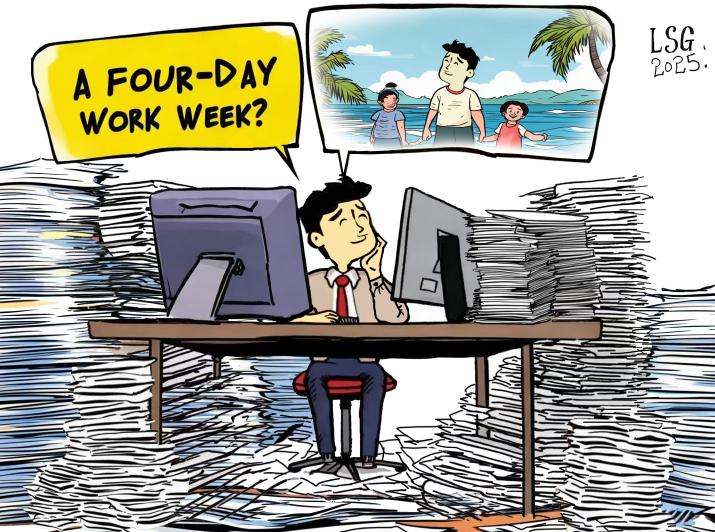| China |
| Is a four-day workweek workable? | |
|
|
 (CARTOON BY LI SHIGONG)
New Year's Day fell on a Wednesday this year, so after a one-day break, people in China returned for two days of work or school before the weekend. This extra day off prompted netizens and media pundits to discuss the virtues of a four-day workweek. At the same time, the city government of Tokyo in Japan announced that from April this year, its employees will begin to enjoy a four-day workweek, in a bid to reverse the country's low fertility rate and help parents balance work and child care. As for whether this work model can prevail in China, opinions vary. Wu Lichuan (Jiupai News): In a four-day workweek, people have more time to be with their families or go out to travel, which greatly improves their sense of happiness. Usually, a short holiday can only be achieved through a complex rearrangement of the workweek. If four-day workweeks become the norm, these difficulties will be reduced. People can make travel plans more deliberately, so that they will not rush to scenic spots at the same time during limited short holidays. Currently, boosting economic prosperity is one of the country's priorities and stimulating the leisure economy and tourism market is an effective way to achieve this goal. With more free time at their disposal, the public can spend more on travel and other consumption activities. Some people worry that, at the current stage, as some companies struggle to implement the two-day weekend system, they cannot be expected to give their employees three days off. It's indeed a problem, but it does not necessarily mean that the four-day workweek schedule is unfeasible. Wang Linlin (Rednet.cn): Four-day workweeks do not fit all organizations. Indeed, some cultural and media companies have begun to try out flexible schedules of workdays, which can help reduce commuting, but these organizations traditionally do not require employees to adhere to strict office hours. In other cases, particularly in the manufacturing and service sectors, staff are required to be on the scene, so in these sectors, a four-day workweek seems unattainable in the foreseeable future. China is at a pivotal stage of economic growth, with various businesses facing fierce market competition, which further requires higher production efficiency and service quality. In this context, a four-day workweek may well increase labor costs for enterprises and reduce their competitiveness, thus slowing the country's overall economic growth. A four-day workweek is a reflection of the public's yearning for a more relaxed lifestyle. Although, this schedule currently encounters various obstacles, social progress and technological innovation in the coming years are expected to gradually help people reach a better work-life balance. Editorial (Gmw.cn): It's a global trend that working staff hope for a less intense work schedule and more relaxation. China's addition of two more days to its holiday list in 2025 responds to public demand. It's not easy to overhaul the current holiday schedule, but the heated discussion sparked by this New Year's Day holiday has reflected the public's strong support for four-day workweeks. So it's alright to allow sectors and employers to first try out this schedule if they find it's possible, to lay out the foundation for changes, or to maintain the status quo if the trial of the four-day workweek eventually fails. BR Copyedited by G.P. Wilson Comments to panxiaoqiao@cicgamericas.com |
|
||||||||||||||||||||||||||||||
|